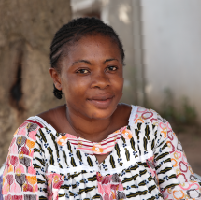Raising the Bar: Cocoa and Gender Equality in Côte d’Ivoire
The Cocoa Fruit Lab in Côte d’Ivoire is empowering women to become the producers and marketers of their own cocoa products, shifting value-addition processes to origin countries. Bringing together actors from across the cocoa sector, this project will create the first entirely women-owned micro-factory in Côte d’Ivoire to produce sustainable cocoa, speciality chocolate and cocoa juice.
While Côte d’Ivoire is the world's largest cocoa-producing country, most cocoa farmers are struggling to reach a living income. This in particularly concerns women, who often own smaller farmlands, have less access to trainings and financial inputs, and lack household decision making power compared to their male counterparts.
By increasing women’s participation in the sector as cocoa producers, juice collectors and chocolate makers, the Cocoa Fruit Lab promotes female entrepreneurship across the supply chain. But it also takes it one step further, by creating opportunities for female farmers to improve the quality of their cocoa beans and to access higher-paying speciality markets.
The project also introduces an income-diversification aspect at the farmer level through the collection of cocoa juice. When chocolate is produced, the white pulp that surrounds the cocoa beans is usually lost as a waste product but collecting it and processing it into juice can create an additional income stream at minimal additional cost, raising farmer income by up to 30 per cent per kilo of cocoa beans.
The Cocoa Fruit Lab is an initiative of ETG’s sustainability foundation Beyond Beans, co-funded by IDH: The Sustainable Trade Initiative, as part of their Cocoa Origins Program. Also involved are women-empowerment focused Fine or Flavour chocolatier Rokbar, and cocoa juice company Kumasi. Technical support is provided by juice experts from Koa and advice on process and quality by Döhler Holland.
Name: N’DRI, Dominique Karell (30)
City / Village: Bouaflé
Project: Cocoa Fruit Lab
Cooperative: COVIMA

As a daughter of cocoa producers, Dominique was always aware of the cultural value of cocoa, but she discovered the economic opportunities it holds through the Cocoa Fruit Lab.
“Last year, thanks to the COVIMA cooperative and ETG | Beyond Beans, I became a chocolate maker,” she says. Through her training, Dominique learned how to use the juice extraction machines, how to pack cocoa juice and chocolate bars, and how to properly preserve chocolate. Dominque now works in the Cocoa Fruit Lab alongside acting as assistant to the cooperative’s president.
Dominque emphasises that “the work of women within the cocoa industry is critical, as through this work, women can support the needs of the whole family.” She believes that people underestimate the work that women can achieve in comparison to men. She also notes that the challenges are different: for example, she believes the main challenge for women is in accessing arable land.
“It is not easy for a woman to get land from a man. Men believe that women do not have sufficient strength and courage to go and work in the fields,” she explains. COVIMA helps to lead the fight to provide women access to land. According to Dominque, this is of great importance. “If, through improving gender equality, more women can their own land, women will become more independent and will be able to bring additional revenues to their families. This will lead to a stronger financial situation for the household, and it will make it easier to send children to school.” Dominique also points out that owning arable land not only allows women to produce cocoa but also to grow other crops such as eggplant, okra, or pepper, thereby diversifying their revenue streams.
Dominique explains that the Cocoa Fruit Lab project was very well received by members of the cooperative as it brought additional revenues, including for herself. She notes that for Ivory Coast, as the world’s largest cocoa producer, being able to locally transform cocoa into a greater variety of products is a great opportunity. “When you transform cocoa, you add value, and when you add value, you earn more money and you are better able to support your family’s needs,” she says.
For Dominique, making her own chocolate gives her a feeling of happiness. It is a great pleasure for her to be able to give people the opportunity to taste their products and to see how they enjoy them.
Finally, Dominique adds that a great challenge both for the project and for chocolate production in Ivory Coast more generally, is the lack of recognition around Ivorian chocolate. This, argues Dominque, does not allow them to compete in larger markets. “We are an artisanal manufacturer for now,” she says. But being an artisanal producer does not prevent her from dreaming that the project will scale up and that eventually, they will be able to increase sales both nationally and internationally. “Our goal for the future is that our chocolate will be sold everywhere!”


